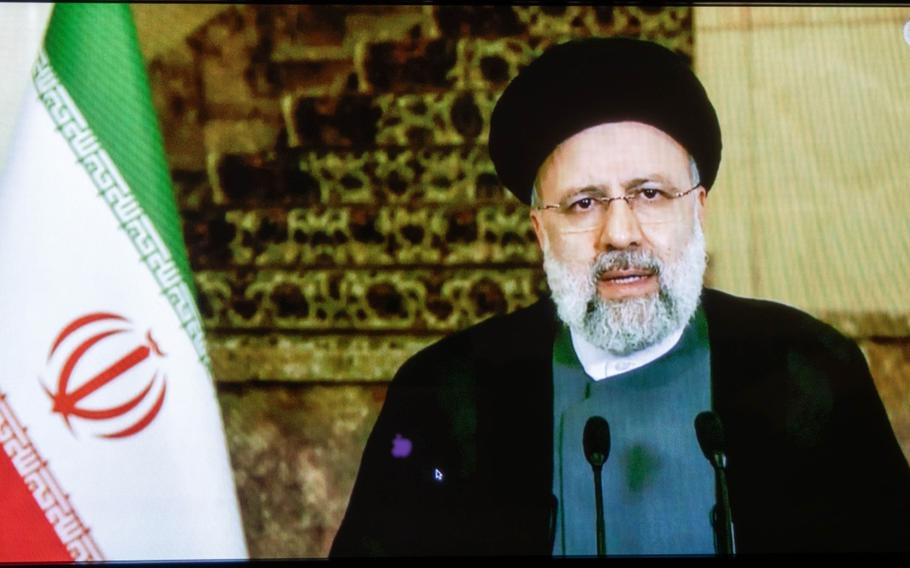
Ebrahim Raisi, Iran's president, speaks during pre-recorded video at the United Nations General Assembly in New York on Sept. 21, 2021. MUST CREDIT: Bloomberg photo by Michael Nagle. (Michael Nagle)
Diplomats trying to salvage a landmark nuclear deal with Tehran wrangled around the clock over sticking points to an agreement that could bring Iranian oil back to the global market at a critical time for the world economy.
European and U.S. officials blew past their goal to clinch a deal in February and are now warning only days remain to reach a deal after more than 10 months of negotiations in Vienna. Russia’s invasion of Ukraine has raised the diplomatic stakes.
“What we want now is an agreement in Vienna. It’s now the time to decide,” German Chancellor Olaf Scholz said Wednesday at a news conference with his Israeli counterpart in Jerusalem.
Oil has surged to $110 a barrel since Russia’s military campaign began and OPEC+, a group of top oil exporting nations plus Russia, offered little significant relief at a low-key meeting on Wednesday, sticking to a preset plan for a modest supply increase.
If the nuclear talks collapse, crude could jump even more because many traders have been expecting a return of Iranian barrels to global markets this year. Iran, which holds the world’s No. 2 natural gas and No. 4 crude reserves, could probably raise exports by around 1 million barrels a day within months of any deal, according to traders.
The sticking points that remain in Vienna are few but significant.
Negotiators worked overnight on Iran’s demand that monitors from the International Atomic Energy Agency end their investigation into its past atomic activities. Western diplomats rejected that bid, citing the watchdog’s independence.
The agency holds a key board meeting on March 7, where Iran could face diplomatic censure over its lack of cooperation with investigators trying to determine the origin of uranium particles detected at several undeclared sites.
“Safeguards are a fundamental part of the non-proliferation system and are separate,” U.K. negotiator Stephanie Al-Qaq wrote on Twitter. “We will always reject any attempt to compromise IAEA independence.”
The only way for the IAEA to bring the Iran probe to an early conclusion is if Iran boosts cooperation, the agency’s director general, Rafael Mariano Grossi, said Wednesday at a press briefing. Grossi said he remains “optimistic” that a solution can be found that doesn’t undercut the independence of his agency.
At the Munich Security Conference last month, Israeli Defense Minister Benny Gantz said it was essential that the IAEA continue to investigate Iran in the event of a revived deal, which Israel opposes.
Meanwhile, Iranian President Ebrahim Raisi spoke with his Russian counterpart Vladimir Putin this week. Tehran’s hardline government has cultivated its ties with China and Russia and wants to develop longterm strategic alliances with the east, even if it reaches a deal with world powers over the nuclear program.
In addition to the IAEA investigation, negotiators remain bogged down over Iran’s demand for a U.S. commitment that it won’t again abandon the 2015 nuclear agreement, which capped Tehran’s activities in exchange for sanctions relief.
The Trump administration unilaterally ditched the accord four years ago and applied economic penalties, prompting Iran to retaliate by enriching uranium close to the levels needed for a bomb. The standoff fueled conflicts in the Persian Gulf, and led to attacks on shipping in waterways key to global commerce.
“If the negotiators fail to bridge the remaining gaps, the best fall back option is a moratorium that averts a perilous cycle of escalation,” said Ali Vaez, who directs Iran research at the International Crisis Group. Iran could offer to freeze its most worrisome activities in exchange for partial sanctions relief, he said.
- - -
Bloomberg’s Gwen Ackerman, Ben Bartenstein, Patrick Sykes and Iain Rogers contributed to this report.